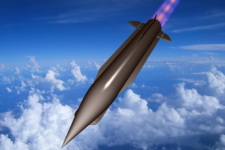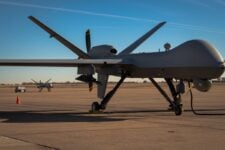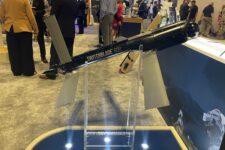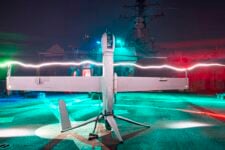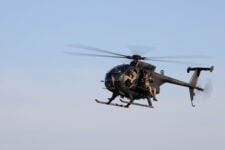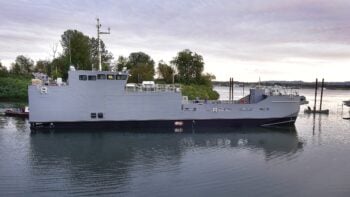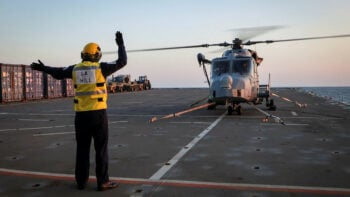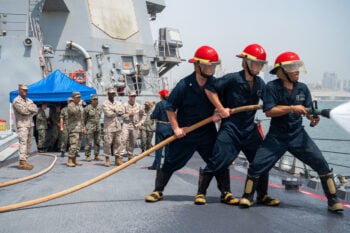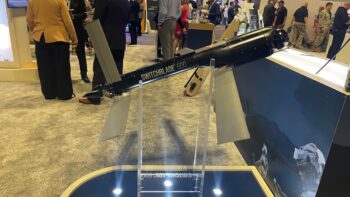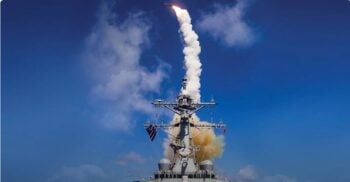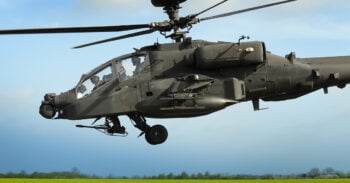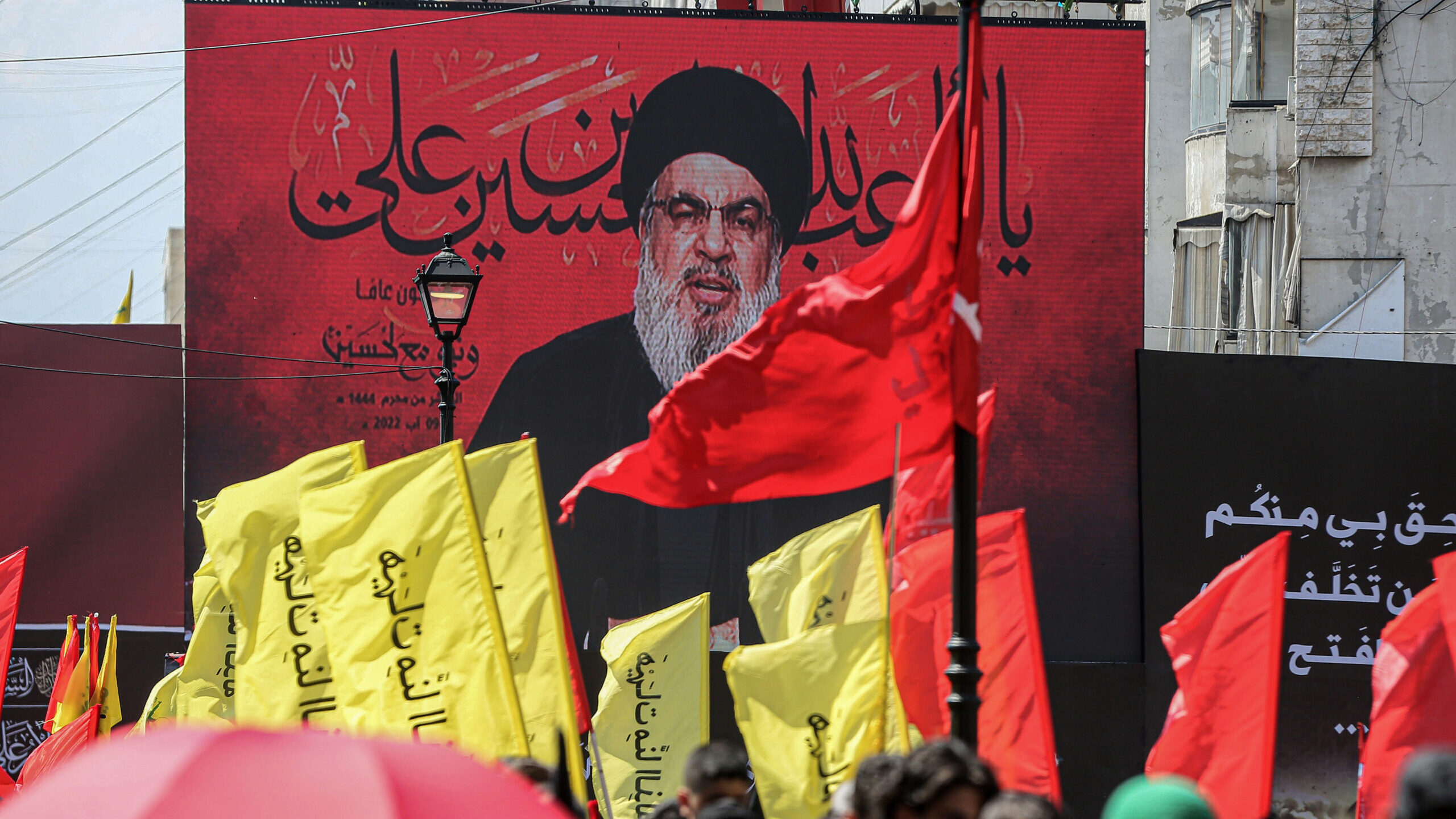
Sayed Hassan Nasrallah, Secretary-General of Hezbollah, the Lebanese pro-Iranian Shia Islamist political group, addresses the crowd on a big screen during a mass rally at Beirut’s southern suburb. (Photo by Marwan Naamani/picture alliance via Getty Images)
DUBAI — Tensions between Iranian-backed Hezbollah in Lebanon and Israel appear to be on the rise over a gas-rich, sea-border territory between the two countries, with leaders on both sides threatening harsh retaliation and severe consequences if either side makes a move. Given the rhetoric, there’s a question of whether another full-blown conflict between Israel and Lebanon could be on the horizon.
But experts believe that there is more posturing than real danger over the territory, judging that Israel is content to continue its policy of “campaign between wars” so long as it is achieving its objectives of preventing advanced Iranian weapons from reaching Hezbollah. Meanwhile, despite the usual litany of threats, analysts judge that Hezbollah is hoping Washington will succeed in brokering a border demarcation agreement that will help it escape an undesired conflict — and potentially, fill its coffers with new funds.
The US has been mediating indirect negotiations between Lebanon and Israel to agree on a compromise solution to the claims and counter claims made by each side placing the sea borders deep into each other’s territory. Washington is currently helping to seal a deal that would regard what is known as Line 23 as the border line with a small bulge southward, giving Lebanon control of a gas field in return for giving Israel full claim over the Karish gas field.
RELATED: With a new Iran deal seemingly near, Israel frets — and plans
The Ukrainian war and the subsequent sanctions on Russia has increased Europe’s demand for gas, and the fields of the eastern Mediterranean could help make up for the lack of energy. The US is hoping that a deal would allow international oil and gas companies to start searching extracting much needed gas off the coast of Israel and Lebanon.
The question of whether Hezbollah would benefit from such a deal, however, makes it a tricky proposition.
Hezbollah, a Lebanese political party with a massive heavily armed Shiite Muslim militia that is strongly affiliated with the Iranian Islamic Revolutionary Guards (IRGC), has proven over time to be a dangerous adversary to Israel, especially after its fighters put on a strong fight in the “Second Lebanon War” waged by Israel in the summer of 2006.
Hezbollah’s political arm has won seats in Lebanese parliament, is represented in the Lebanese government and is regarded as the main power-broker in the country. Experts believe any effort to forcefully disarm the Shiite group would spark a new Lebanese civil war in the multi-sectarian country.
That may be part of the reason that, for the past 16 years, the battlefront between the two sides in south Lebanon has been largely calm, except for few minor incidents. Instead, the action moved to Syria, where the IRGC has substantially built its military capabilities using Shiite militias established locally with Hezbollah’s help, plus some imported fighters from Iraq. Israeli warplanes have launched dozens of attacks over the past years against the bases of the IRGC militias, mainly targeting shipments of advanced weapons like accurate cruise and ballistic missiles, surface-to-air missiles, anti-ship missiles and drones.
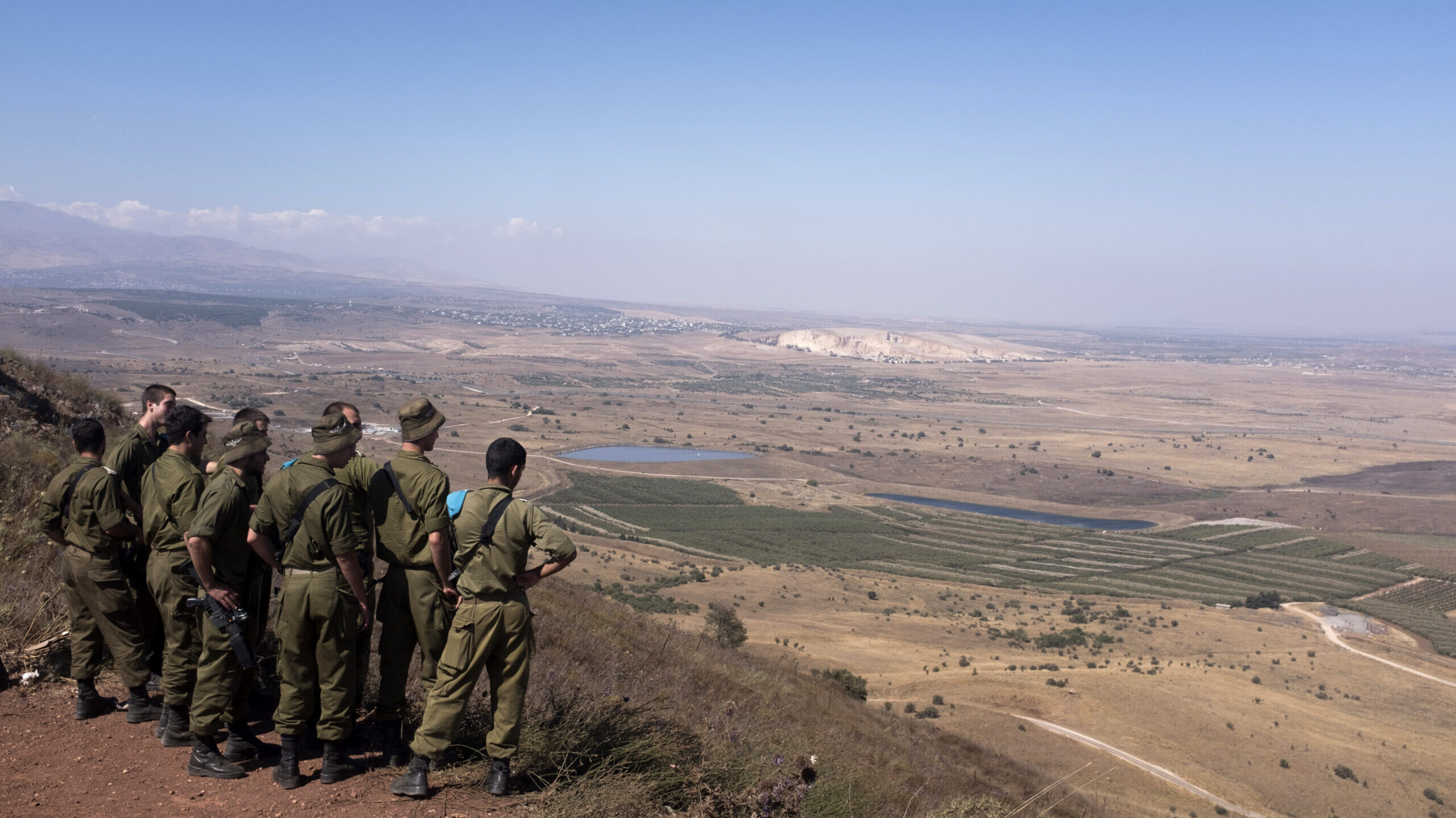
Israeli soldiers look out towards Syria from an observation next to the Syrian border on July 23, 2018 in Golan Hights, Israel. (Photo by Lior Mizrahi/Getty Images)
The gas field issue, however, may be upsetting that status quo. In late July, Hezbollah Secretary General Hassan Nasrallah issued an ultimatum to Israel, threatening to attack offshore gas rigs in a disputed sea-border territory if Israel proceeds with extracting gas before a border-demarcation agreement with the Lebanese government can be reached.
Notably, Hezbollah has not criticized the Lebanese government for entering into the US-led, indirect talks with Israel to demarcate the sea borders, which led many to conclude that the group supports the efforts that would eventually lead to Lebanon being able to start excavating oil and gas in its own territories — generating substantial income to a bankrupt country.
RELATED: In Syria, Iranian forces fill gaps left by Ukraine-bound Russians, sources say
Nasrallah’s high rhetoric instead appears to be meant to enforce the perception that Hezbollah’s military capabilities and saber-rattling is what is forcing Israel to negotiate and make concessions to Lebanon. This serves Hezbollah’s agenda in making its militia a legitimate organization and part of the Lebanese defense establishment.
On July 2, Hezbollah sent three drones over the Karish gas platform as a show of defiance and broadcast footage captured by the Iranian-made UAVs before they were shot down by the Israeli Defense Forces (IDF).
Israeli officials in return have warned of severe retaliation against Hezbollah and Lebanon if its gas rigs were attacked. The Israeli cabinet has met several times in the past couple of weeks to assess the situation and ordered the military to remain on alert to see whether excavation could start before an agreement is reached with the Lebanese government.
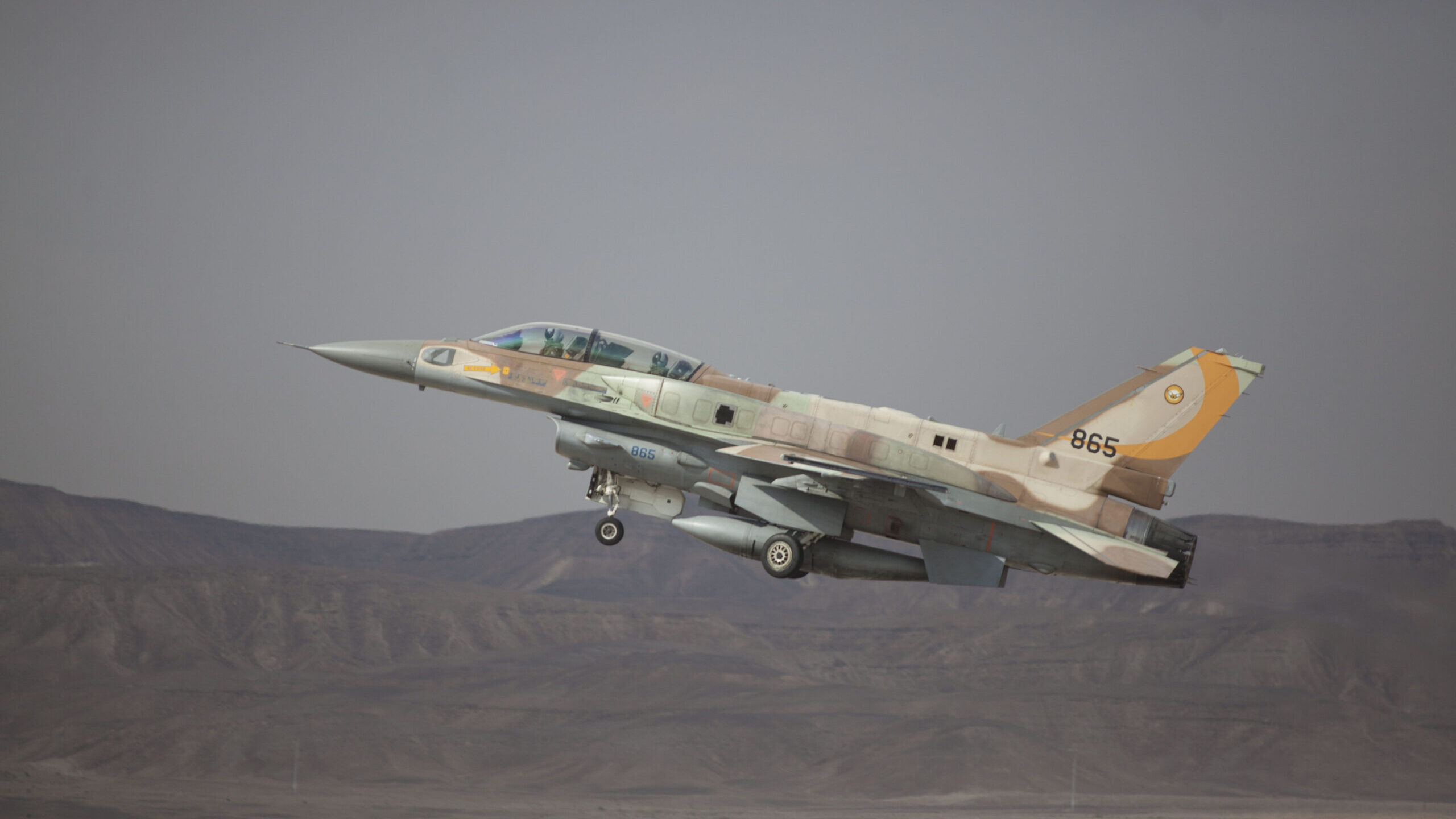
An Israeli F-16 jet takes off on December 9, 2014 at the Ovda airbase in the Negev Desert near Eilat, southern Israel. (Photo by Lior Mizrahi/Getty Images)
But according to Hanin Ghaddar, the Friedmann Fellow at The Washington Institute’s Geduld Program on Arab Politics, despite the rhetoric, Nasrallah actually wants to see a border deal reached between Lebanon and Israel because it will release him of his pledge to attack the Israeli gas platform, which would spark a war.
Nizar Abdel Kader, a retired Lebanese Army Brigadier General and a prominent regional defense expert, believes that despite his threats Nasrallah does not want a war with Israel, both because of Israel’s military superiority and due to the adverse economic conditions, the Lebanese are going through now.
“Hezbollah has not retaliated against Israeli raids on bases for the IRGC and its affiliated militias in Syria because it wants to avoid a showdown with Israel that would bring about huge devastation to the predominantly Shiite areas in southern Lebanon and the Beqaa valley that provide the friendly environment for Hezbollah gunmen to operate,” Abdel Kader said. “If Israel launches a full-scale war on Hezbollah’s areas of control in Lebanon, there will be extensive destruction which will likely cause huge anger within the Shiite community against Hezbollah and Iran.”
“Unlike the war in 2006, this time none of the oil-rich Gulf Arab States will rush to help in the reconstruction of the destroyed homes and infrastructure due to the strained relations between these states and the Iranian-Hezbollah axis. Lebanon is already in a dire economic situation with a bankrupt treasury and hyperinflation,” Abdel Kader told Breaking Defense.
However, there are concerns that Nasrallah might fall victim of his own rhetoric if Israel refuses to make concessions. For instance, the drones that flew near the platforms may have been intended as a show of force, but if, say, one had malfunctioned and crashed into the platform, Israel’s response would likely have been much more forceful.
Israel And Campaigns Between Wars
Right now, the border situation is trending in the direction of a compromise. But the threats by Nasrallah have prompted some to wonder whether Israel’s long-standing deterrence strategy, based on the idea of “campaigns between wars” or “war between wars,” remains viable against a bold adversary armed with tens of thousands of artillery rockets and possibly some ballistic missiles and surface-to-surface missiles and many drones.
“In the ongoing confrontations between Israel and Hezbollah/Iran, the former has achieved a tactical success, while the latter has gained a strategic one,” said Gawdat Bahgat of the National Defense University in Washington. “Israel has continued its raids against Shiite militias and Iranian targets in Syria and Iraq. Unknown numbers of Iranian and Hezbollah fighters were killed in these raids. However, Iran has managed to maintain the close ties with these militias, expanded its missile and drones programs.”
Zohar Palti, the former head of the Political-Military Bureau at the Israeli Ministry of Defense and currently the International Fellow at the Washington Institute for Near East Policy, sees things differently and argues that the Israeli deterrence policy remains effective.
“For the time being — the war between the wars — is the best and maybe the only strategy that we have, mainly because that the alternative is either to do nothing or to go to a war on a large scale,” Palti said. “Those are not really options because we can’t open a war every couple of months or not even years. We prefer to continue with this strategy. At least for the time being.”
He added that “in Syria it works quite well. The Iranians wanted to be in a different place by now and they are not. Our mission was and still is to prevent third arena [front] where surface to surface missiles and rockets aiming at Israel. So far, we are OK”
Patrick Clawson, the research director at the Washington Institute for Near East Policy, agrees with Palti.
“I have been impressed at how much Israel has been able to slow acquisition by Hezbollah and the Iraniian proxies of precision missiles,” Clawson told Breaking Defense.
“Four years ago, I assumed that by now, Hezbollah et al would possess large numbers of such missiles as well as other game-changing weapons such as accurate drones equipped with large bombs. In fact, the numbers appear to be quite limited,” Clawson said. “My reading is that in part because of the success against the precision missiles project, Israeli circles are rather satisfied with how they are doing with the war between the wars strategy both on the northern and southern [Gaza] fronts.”
But if war was to break out between the two sides, experts believe the military campaign would be different than the last time, and it would likely involve an Israeli ground offensive deep into Lebanese territory to evict Hezbollah fighters and destroy missile depots and tunnels.
“The only way for Israel to stop Hezbollah’s missiles from hitting deep into its territory is to launch a massive land invasion to capture all of south Lebanon and parts of the Beqaa Valley,” Abdel Kader said. “Most public opinion in Lebanon and the Arab world is against Iran and Hezbollah today and this will certainly impact the outcome of the war, including the fate of tens of thousands of Shiites who will be forced to flee their homes and will likely face a hard time finding a friendly hospitable environment to take shelter.”
Bahgat believes the same, saying “the outcome of a military confrontation between Iran/Hezbollah and Israel will depend on which side will be able to impose its way of fighting on the other side. Israel prefers short-term military operations while Iran and its proxies favor a long-term war.”
Abdel Kader, like many other experts, believes that Iran wants to preserve Hezbollah’s military strength as a way to respond if its nuclear facilities came under Israeli attack. Israeli officials have often threatened that if diplomatic efforts to curtail the Iranian nuclear program fail, they will likely resort to the military option to prevent Tehran from acquiring a nuclear weapon.
“I’m really concerned about the last statement of Nasrallah. We will have to wait and see , it’s not over till it’s over,” Palti said.
TAI exec claims 20 Turkish KAAN fighters to be delivered in 2028
Temel Kotil, TAI’s general manager, claimed that the domestically-produced Turkish jet will outperform the F-35 Joint Strike Fighter.


